With many users now using laptops instead of desktops, choosing the right laptop for your needs can be a confusing task, but finding the right one for you is easier than you think. Here is our pick of five best laptops for doctors, based on availability, price, and performance.
Laptops are a great way to stay productive as a doctor, as they are not only light but also make it easy to use many medical apps and tools. However, choosing the right laptop for your needs can be a difficult task.
We’re now about a decade removed from notebooks made of a single sheet of paper, and the standard has evolved far beyond the clamshell design of yesteryear. The days of a standard 2-in-1 are long gone, with powerful devices like Microsoft’s Surface Book offering both a tablet and a laptop in one package. But while 2-in-1s offer a lot of flexibility, they’re also a lot bulkier and more expensive. Enter the ultraportable: the ultraportable is the laptop that hits the sweet spot of weight, price, and power. If you’re looking for a laptop that can easily go from the boardroom to the coffee shop, these are the best you can buy.
Which laptops are the best for doctors? As a doctor, you’ll need a laptop that’s both portable and small in size. While using bespoke software and hefty medical applications, it should provide optimum performance.
Not all computers on the market today will meet the requirements of a doctor, which vary based on their specialty. Furthermore, laptop manufacturers seldom produce products that are intended for medical usage or by physicians.
As a result, your search for a laptop for physicians may be more challenging. Because there is no label that says, “Made for physicians,” you’ll have to look at the laptop’s specifications and settings to get the most out of it.
The display size and resolution, the processor type and speed, the amount of RAM and storage, and the battery life, among other things, should all be considered before purchasing a laptop to guarantee that it improves your productivity.
You must also take into account the extra needs of the hospitals where you operate, as well as the demands of the environment, germicide resistance, durability and resistance to wear and tear and spills, and heavy-duty cleaning.
All of this may require a significant amount of time and effort on your part, which you may not have naturally. If that’s the case, here are five suggestions for you to think about.
There is also a purchasing guide at the conclusion that will tell you what features and characteristics to look for in a doctor’s laptop. This can help you narrow down your search and get things forward faster.
A Doctor’s Importance of a Laptop

The significance and uses of a laptop for a doctor are many and diverse, including but not limited to patient monitoring, medical research, and study.
Apart from personal purposes, the use of a laptop by a doctor may aid in remote patient monitoring, medical research, scheduling, and database checking.
You’ll have a lot of duties as a doctor, and you’ll have to multitask a lot. That is why you will need a laptop that will enable you to effectively do all of your duties while on the road as well as in an emergency.
You may work as a primary care physician, a specialized neurologist, or even a hospital administrator, but you’ll need this equipment to get the job done.
As a general practitioner, your laptop use may be limited to mostly workplace purposes. Text processing, internet searches, taking notes, arranging your calendar, managing your emails, and other tasks may need it.
Due to the computerization of medical and health data, a laptop will allow you to access patient information without having to sift through a lot of paperwork.
In summary, a laptop will assist a doctor in practicing medicine, professional management, administrative elements of the work, correct documentation and billing, as well as pursuing hobbies.
However, depending on the doctor’s specialization, the criteria may differ. For example, rather of utilizing the gadget for general purposes, a neurologist would utilize it for neuro navigation and analyzing various pictures in order to make a correct diagnosis.
This implies that a doctor’s usage and requirement for a laptop will vary based on the components of his or her specialty.
As a result, a laptop aids in the maintenance of patient EMRs. To conclude, using a laptop and electronic medical records by physicians has many advantages, including reduced expenses and mistakes, reduced risks of lost papers, and reduced the need for repeat testing.
Information also enables sharing and cooperating with other team members, as well as assisting everyone in becoming better acquainted with the patient’s medical history by providing simple and immediate access to it.
It aids in enhancing communication and teaching patients, even if they are not native English speakers. Most significantly, it will aid in the seamless and rapid collection of information on a specific patient during an emergency scenario.
Minimum & Recommended System Requirements for Doctors
A doctor would require at least an Intel Pentium 4 processor with a base clock speed of 4 GHz or a dual core Intel i5 processor with a minimum frequency of 1 GHz to perform the most basic of tasks on a laptop.
Also needed are 4 GB of RAM, 1 GB of free hard drive space, and a decent graphics card with DX 9 support and WDDM 1.0 driver or higher compatibility, as well as a 13.3-inch screen for a 32-bit or 64-bit CPU.
However, as medical research advances and medical software develops, your computer requirements will grow. As a result, it’s a good idea to get a laptop that meets the recommended system requirements listed below in order to have a computer that’s ready for the future.
Minimum system requirements: Intel Core i5 CPU 8th generation or higher| 8 GB RAM | 256 GB SSD storage | Integrated Intel UHD Graphics 620 | 14-inch screen | 1366 x 768 pixels display resolution | 8-hour battery life
8th generation Intel Quad Core i7 or higher processor| 16 GB of RAM or more | 512 GB SSD or more | Dedicated Nvidia GeForce MX 150 or higher graphics chip | 15.6-inch screen or larger | 1920 x 1080 pixels or higher screen resolution | 10 hours of battery life or more
2021’s Top 5 Laptops for Doctors:
1. Apple MacBook Pro – Overall Winner
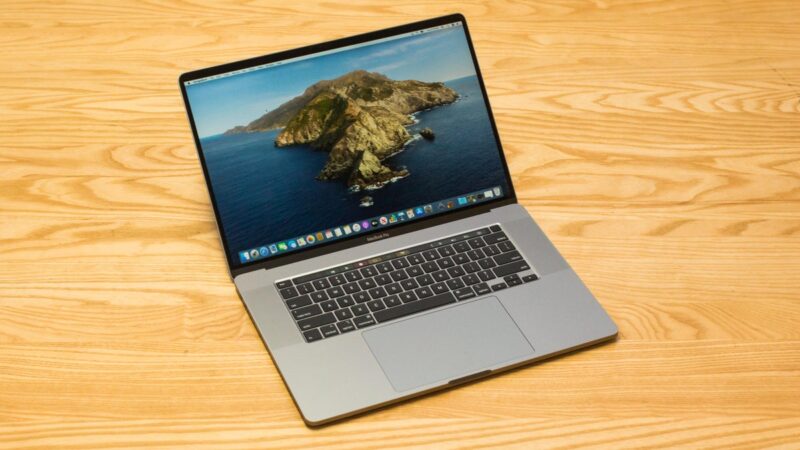
Apple MacBook Pro
Bottom Line: Doctors searching for everything excellent in a computer and the greatest overall performance will find this laptop to be one of the most appropriate gadgets for them. The sleek design, high-resolution screen, extended battery life, and powerful CPU and GPU all contribute to its effectiveness.
Characteristics
- 15.4-inch display
- 512 GB SSD storage
- DDR4 SDRAM (16 GB)
- Intel Six Core i7 8th Generation Processor
- MacOS is the operating system.
- AMD Radeon Pro 5300M GPU
Pros
- This laptop has an excellent screen.
- This system’s battery life is very impressive.
- The system’s build quality and general performance are excellent.
Cons
- The system is very large, weighing in at almost seven pounds.
- A numeric keypad is not included with the keyboard.
- Given the pricing point, the specifications might have been better.
Despite its high price, this laptop is one of the finest for physicians. It’s extremely elegant, and the appealing design makes it one of the most beautiful laptops.
Thanks to the screen’s superior Retina Display technology, the screen’s resolution and brightness are good enough to minimize, if not eliminate, eye strain and weariness.
The system has an 8th generation Intel Core i7 CPU with six cores that runs at a low base clock frequency of 2.2 GHz and can be overclocked to 4.1 GHz utilizing Intel Turbo Boost technology.
The Radeon Pro 5300M graphics card has 4 GB of GDDR5 video memory, which is supported by DDR4 SDRAM running at 2400 MHz and SSD storage.
The system’s 87-watt USB-C power adapter, as well as the 2m USB-C charging cable, offer enough power. Check out our review of the Apple Macbook Pro.
Runner-up: Asus ZenBook UX434FL Asus ZenBook UX434FL Asus ZenBook UX4
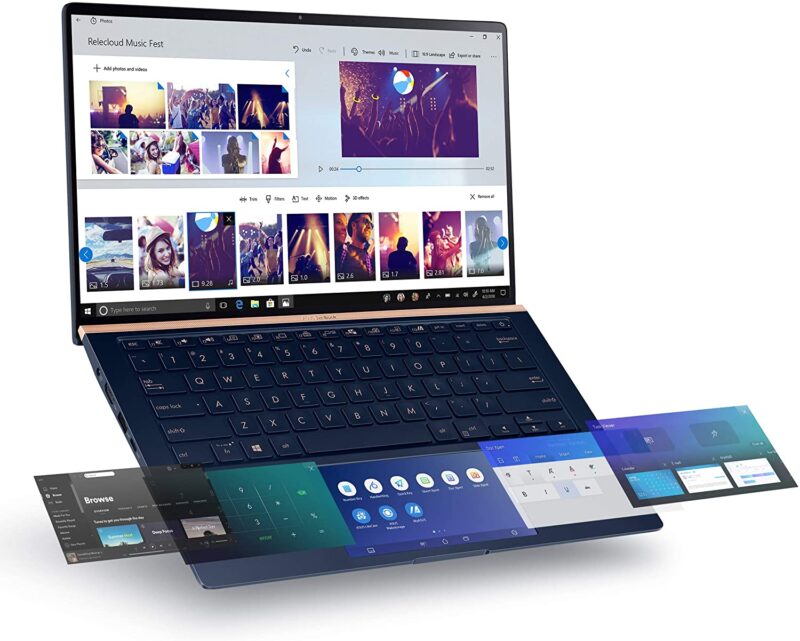
Asus ZenBook UX434FL
Bottom Line: While the CPU in this laptop for physicians is a little slower (four cores vs. six in the previous laptop), the pretty good dedicated graphics card, the revolutionary Screen Pad 2.0, sufficient connection, and other features in it do not slow it down in action.
Characteristics
- 14-inch display
- 512 GB PCIe SSD storage
- DDR4 SDRAM (16 GB)
- 8th generation Intel Quad Core i7 8565U processor
- Windows 10 Professional (OS)
- Nvidia GeForce MX250 GPU
Pros
- The laptop’s screen has a Nano Edge bezel, which allows for greater viewing area.
- A new Screen Pad 2.0 is also included with the laptop.
- With its unique Ergo Lift design, the system provides a superior typing posture.
Cons
- There is no optical drive included with the system.
- There is no anti-glare function on the screen.
- This system’s USB C connector does not allow charging.
This is a laptop that is well-known for its overall performance. Whether you’re an Army doctor, a general practitioner, a primary care physician, or a medical researcher, it will meet your computer requirements.
If you’re looking for a reliable laptop with a high-performance four-core processor, a good graphics card, enough RAM and storage, a good and useful design, high durability, a long battery life, light weight, compact yet with extended connectivity, and a nearly bezel-less display, the Asus ZenBook 14 is one of your best options.
Along with other advantages, this laptop has an Ergo Lift design for a better typing experience. When you utilize several tabs while surfing the web or multitask with various applications and medical software, it will not slow down.
The almost bezel-less screen has a body-to-screen ratio of 92 percent, making the 14-inch screen seem larger and delivering pictures at 1920 x 1080 pixels.
Aside from providing an immersive watching experience, the screen also provides broader viewing angles for good visuals.
This laptop stands out for its extensive connection choices, which include a lot of USB ports.
The extremely responsive and inventive 5.65-inch interactive touchscreen touchpad is the finest element of the system design. This will adapt to your requirements, making multitasking and control easier.
Switching applications and docked windows from it to the main display, taking notes directly on it, and utilizing it as a dedicated numeric keypad for quicker and simpler numeric data input will all be made easier.
3. Acer Aspire E15 is a laptop computer manufactured by Acer. – Good Value
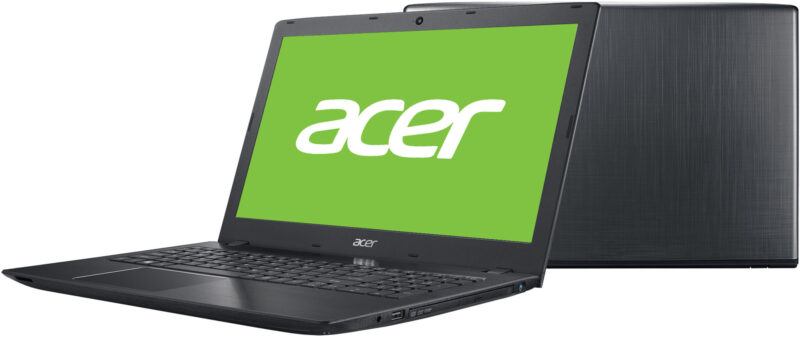
Acer Aspire E15
Bottom Line: This laptop is one of the finest laptops for physicians because of its superior price-to-performance ratio. It will provide excellent value for money. The fact that it was relatively inexpensive did not prevent it from having appropriate and very efficient hardware that can easily run medical software.
Characteristics
- 15.6-inch display
- 256 GB SSD storage
- DDR3 SDRAM (eight gigabytes)
- 8th generation Intel Core i5 8250U processor
- Windows 10 Home is the operating system.
- Nvidia GeForce MX 150 GPU
Pros
- This laptop’s keyboard and touchpad have a great feel to them.
- A DVD/RW drive is included with the system.
- Overall, the performance is strong and quick.
Cons
- This laptop is not very portable, weighing more than 5 pounds.
- The screen brightness of 200 nits is below average.
- The timeout for the keyboard backlight is not changeable.
The Acer Aspire E 15 may pique your interest if you’re searching for a low-cost laptop for physicians and experts. It will provide you the best return on your investment.
This is a good-looking computer that performs well overall. It will be very beneficial to physicians who work in harsh, inhospitable, and brutal environments on a daily basis.
This laptop’s screen is very big, providing for additional viewing area. By stacking a few reports and tests of a few patients to each other, sufficient real estate will allow all medical professionals to accomplish different duties.
The reasonably big screen will provide you a broad enough view of MRIs, X-rays, and other medical images.
Despite its weight, this laptop has an Nvidia GeForce MX 150 graphics card, which provides great viewing pleasure with quicker and more accurate color reproduction. It will improve your game experience in your spare time as well.
All of your medical applications and programs will operate efficiently on this computer thanks to the 8th generation Intel Core i5 CPU, SSD storage, and DDR3 RAM.
This laptop also has a long battery life of 15 hours when used moderately, enabling you to work on it all day.
The system also has a variety of ports and connection choices, including as dual-band 2.4 GHz and 5 GHz 802.11ac wi-fi with MU-MIMO technology, Bluetooth 4.1, and Gigabit Ethernet.
One USB 3.1 Type C Gen 1 port that supports up to 5 Gbps, two USB 3.0 ports, one of which may be utilized for power-off charging, one USB 2.0 port, and one HDMI port with HDCP compatibility are among the ports featured in the system.
A HD Webcam with a resolution of 1280 x 720 pixels and support for High Dynamic Range (HDR) is also included. Take a look at the Acer Aspire E15 Review.
4. ThinkPad X1 Carbon from Lenovo — Ultra-compact and powerful
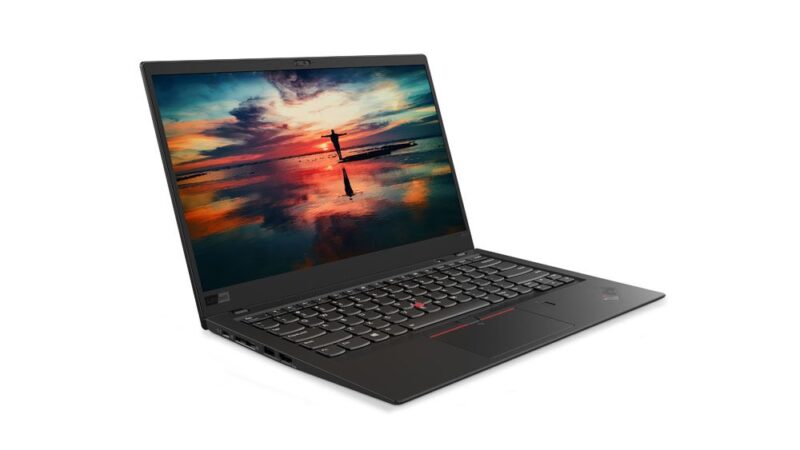
Lenovo ThinkPad X1 Carbon
Bottom Line: This tiny laptop is quite light, weighing less than 2.5 pounds, making it one of the most portable for physicians to take to clinics, patients’ homes, or a seminar. The 8th generation Intel Core i7 CPU, together with enough RAM and storage, performs all tasks well.
Characteristics
- 14-inch display
- 512 GB PCIe SSD storage
- DDR4 SDRAM (16 GB)
- 8th generation Intel Quad Core i7 8650U processor
- Windows 10 Professional 64-Bit
- Intel UHD Graphics 620 GPU
Pros
- The laptop is very light.
- The system’s overall performance is excellent.
- The port selection and inclusion is very good.
Cons
- The system’s battery life might have been better.
- The speakers’ sound quality is very poor.
- The fingerprint reader is slow to react, and it takes a few attempts to get it to work.
This is the machine to choose if you want a portable computer.
The Lenovo ThinkPad X1 Carbon is ideal for physicians since it has a tiny screen, an 8th generation quad core CPU, and sufficient RAM and storage to handle all medical applications and books.
This fast laptop will allow you to multitask while using some of the most advanced medical applications and software.
Thanks to Intel UHD graphics, the performance of this system will never suffer, allowing you to readily view pictures of bones, tissues, and other organs.
You can view and evaluate everything with more detailed information of your patients’ 3D and 4D bone scans, X-rays, MRIs, and other images.
If you wish to connect several devices to your laptop, this machine also has adequate ports. With its wireless LAN IEEE standard of 802.11a/b/g/n/ac, Ethernet, and Bluetooth technologies, you’ll have plenty of connection choices.
A front camera and a fingerprint reader are included in the system. One HDMI port, two USB 3.0 ports, and two USB Type C ports are included among the ports.
The 64-bit operating system architecture of Windows 10 Pro allows you to better organize your duties and work on your files. Check out our review of the Lenovo ThinkPad X1 Carbon.
5. 15Z980 LG Gram – Long-Lasting Battery
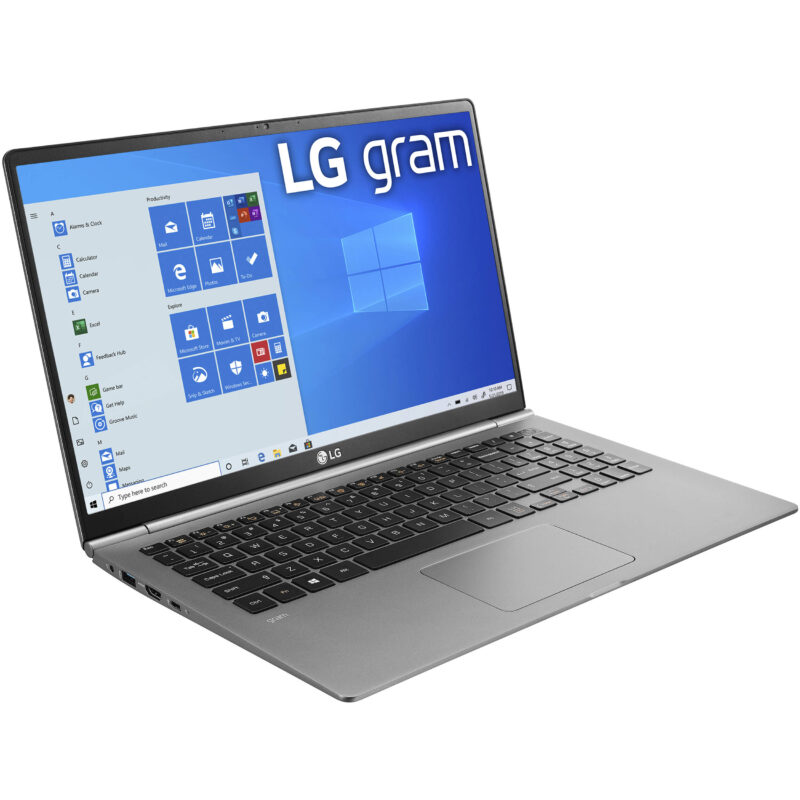
LG Gram 15Z980
Bottom Line: Due to its extended battery life, this is one of the finest laptops for physicians to work on all day on the road without having to worry about recharging it. The lithium-ion battery has a 72-watt-hour capacity and can last up to 16.5 hours on a single charge, allowing physicians to work efficiently throughout the day.
Characteristics
- 15.6-inch display
- 512 GB SSD storage
- DDR4 SDRAM (16 GB)
- 8th generation Intel Core i7 8550U processor
- Windows 10 Home is the operating system.
- Intel UHD Graphics 620 GPU
Pros
- The system’s battery life is very lengthy.
- The track pad is responsive and excellent.
- The screen is pleasant to look at and has excellent color calibration.
Cons
- The laptop’s camera might have been better.
- The wi-fi reception isn’t very good.
- Swipes seem to be resistive on the touchscreen.
For physicians, this is one of the finest thin and light laptops available.
This laptop has a full HD IPS touchscreen, a respectable CPU, and a long battery life.
The specifications and build quality are also unaffected, making it a long-lasting laptop with excellent components.
Indeed, this laptop, which can be lifted with two fingers, has passed seven tests and has been certified as military-grade durable. It’s even harder thanks to the best nano carbon magnesium metal body.
This laptop has enough ports on both sides to provide you with a variety of connection choices.
To connect a variety of external devices and manage your data effectively, you’ll receive a number of full-size USB 3.0 ports, Type-C USB ports for quicker data transmission, HDMI connector, and more.
The illuminated keyboard makes typing in the dark more comfortable, and the sensitive touchpad accommodates up to four-finger multi-touch motions.
The fingerprint sensor in the top-right corner of the power button allows for safe login and usage of the device. The dedicated numeric pad adds to the convenience and comfort.
The Intel Core i7 processor’s four cores operate at 1.8 GHz, boosting performance, which is further boosted by the 16 GB of DDR4 dual channel memory and SSD storage.
This laptop’s performance, even at the basic clock level, is quite dependable for all your computer activities, including video conferencing, thanks to the Intel UHD Graphics 620 processor.
This laptop’s cooling system is very effective, so you may use it for quite some time. You can also use it both inside and outside your workplace thanks to the 16.5-hour battery life.
The display creates vibrant images with great color contrast and color saturation. It has excellent viewing angles, enough brightness to use in any setting, and a tilt of approximately 160 degrees for improved visibility.
The laptop’s audio system is also very good, resulting in clear and better sound output.
What to Look for When Purchasing the Best Laptop for a Doctor
It may seem that physicians may utilize any laptop that is available on the market. Although this isn’t completely incorrect, there are a few things to consider and look for before purchasing one of the best laptops for physicians.
This will increase the value of your investment and guarantee that your laptop operates at a higher level, more consistently, and just how you want.
The criteria for purchasing a laptop for a doctor should ideally be based on the computer’s intended usage, the requirements of the doctor’s specific profession or kind, and the budget.
The power and speed of the CPU, the memory, the performance and kind of graphics card, the storage, the battery autonomy, the weight, and the flexibility of the laptop should all be taken into account when buying a new laptop.
Processor
Whether a doctor, a writer, an architect, or a student uses a laptop, the CPU is one of the most essential components.
You may be certain of a better and higher performance if the CPU is quick enough. A doctor, on the other hand, will not need a laptop with a super-fast CPU.
On the other side, if your laptop’s CPU is sluggish, loading the applications and programs you wish to use will take a long time. Because time is money, you will not want to waste either.
As a result, while purchasing a laptop, you should prioritize the CPU. If you’re on a tight budget, an i3 or i5 CPU is ideal, but if you can afford it, opt for a laptop with an i7 or i9 processor.
The Intel Core i5 and Intel Core i7 processors are the most common mainstream consumer CPUs today, with the i7 processors being much more powerful than the i5 versions. The CPUs in entry-level laptops are usually Intel Core i3s.
Do not be puzzled if you select a laptop with an AMD Ryzen CPU since the naming concept is the same as Intel Core. This implies that a Ryzen 5 CPU is equivalent to an Intel Core i5.
If you’re a specialist, like a radiologist or a neurologist, you’ll need a fast CPU in your laptop to handle graphics-intensive applications and apps.
Then search for an Intel CPU with a number that ends in ‘H,’ which stands for ‘high-performance graphics.’
RAM
The quantity of RAM in your laptop will determine whether or not your working experience is seamless.
A sufficient quantity of RAM on the device will significantly assist you in effectively, swiftly, and seamlessly handling large software programs and apps.
If you’re on a budget, you can usually do without 8 GB of RAM in our laptop. Otherwise, if you can afford it and want your laptop to be future-proof, choose a laptop with 12 or 16 GB of RAM.
If you choose a laptop with less RAM, be sure the system architecture enables you to upgrade it as needed.
If your job as a doctor is mostly office work and you don’t require your laptop very much, you may get by with 4 GB of RAM rather than 8 GB.

Card for graphics
If you don’t plan on using your laptop for graphics-intensive work, a standard Intel HD graphics card will do.
However, most physicians are needed to utilize high-end software and applications in order to examine various pictures of organs in minute detail. As a result, a dedicated AMD or Nvidia GeForce graphics card in your laptop is preferable.
The GeForce GTX 1050 series, which has a better power-to-price ratio, is the best option.
If you need even more horsepower, go for a laptop with a GTX 1060 or GTX 1070 graphics card, or an AMD Radeon RX Vega 56 graphics card.
Storage
This is a feature of the laptop that requires particular attention. Doctors often need to maintain a huge number of data for a variety of patients who have unique or complicated illnesses.
This will not only serve as a handy reference for them in the future, but it will also aid them in their research.
Normally, most laptops nowadays come with 256 GB of storage, which is sufficient, but choosing for one with 512 GB will be much more practical.
If you need more storage than that, you may get 1 TB or more, but this will almost always be an HDD.
The issue with HDD storage is that owing to their moving components, these hard drives are considerably more susceptible to damage.
These are similarly slower in terms of speed and performance, and they will heat up much more rapidly than an SSD, but they will be much less expensive.
As a result, if you require quicker and more reliable performance and durability, a laptop for physicians with 512 GB of SSD storage is preferable.
A laptop with cloud storage is also a good choice since you won’t have to worry about losing your data. You’ll be able to synchronize your files automatically and access them from anywhere at any time.
Display
This, too, is dependent on your budget and requirements. If you’re on a tight budget, a 15-inch display will do; otherwise, a laptop with a 17-inch display is recommended.
You must, however, ensure that the screen’s resolution is not less than 1920 x 1080 pixels, regardless of its size. The pictures shown will be less prominent and grainier if this is not done.
Life of the battery
Indeed, the battery’s autonomy is a critical issue that should not be overlooked.
Because you’ll be on the go the majority of the time, a laptop with a long battery life is important. This will allow you to work on it for the whole day without having to refuel it.
A laptop’s battery life for physicians should be between 10 and 15 hours at a minimum. If your laptop’s battery life is less than that, you should learn about and apply one of the many helpful solutions that may help you maintain or improve your laptop’s autonomy.
Weight
As a doctor, you’ll be on your feet a lot, therefore a lighter laptop is suggested. This will increase your laptop’s mobility and convenience, making it your most productive technical friend.
Apart from working in your workplace, you may take it with you when you visit one patient after another or attend conferences.
If it combines power and elegance, a featherweight and ultra-portable laptop is the perfect option to make your travels and tasks less tiresome. You should search for computers that weigh between 3 and 5 pounds, preferably less.
Flexibility
A laptop for physicians should not only be light in weight, but also have a lot of flexibility. A flexible laptop can readily adjust to your requirements and circumstances at any time.
Nowadays, you’ll find a number of hybrid laptops, also known as convertibles, that you can use as a tablet, a studio, and a laptop.
Some models even allow you to remove the screen and use it as a stand-alone tablet. This will give you more options.
FAQs:
Is a specialized graphics card necessary for a doctor’s laptop?
No, it isn’t required, although it is beneficial to have one. This is because there may be instances when you’ll need to produce information using specialized software or applications. In such cases, an integrated graphics card may sufficient, but a separate graphics card will improve performance and speed while also increasing visual quality.
Is it necessary for all physicians’ computers to be expensive?
No, no, no, no, no, no, no, no, no, no, no, no It all depends on the kind of use, the hours, and the pattern of consumption. However, rather than opting for a low-cost laptop, it is preferable to invest in one with greater specifications, mobility, durability, and performance. All of these features will come at a cost, but they will make your system future-proof, allowing it to endure normal wear and tear while ensuring smooth performance and staying cool under high workloads or extended periods of usage.
What should the weight of a doctor’s laptop be?
A doctor is usually on the move the most of the time, therefore they may need to take their data with them. As a result, the laptop for a doctor should be very portable and light in weight. Though ultra-slim and ultra-portable laptops are the greatest option, any laptop, or even a convertible for that matter, that weighs between 3 and 5 pounds is recommended for a doctor’s laptop.
Why would I want to use a doctor’s laptop rather than my tablet?
There are two main reasons why a doctor should use a laptop rather than a tablet. The first and most important reason is that a tablet may not be compatible with the various software and equipment required in the hospital. The second argument is that a laptop will outperform a tablet while weighing almost the same. As a result, using a laptop rather than a tablet will provide you with greater performance and mobility.
How can I make using a laptop for doctor’s appointments more enjoyable?
Some extra functions in the laptop for physicians may improve your usage experience. Biometric login techniques, a lighted keyboard, and improved connection are some of the things to look for when purchasing a laptop. All of these features will improve security, ease of use, and your overall user experience.
This year, in an effort to help you better equip yourself to navigate the tech world, we’ve brought you a list of laptops to consider as your next purchase. The list is based on the assumption that you’re a working professional, someone who takes their work seriously, and you want to find the best laptop for a six-figure salary.. Read more about best laptop for doctors india and let us know what you think.
Frequently Asked Questions
What laptop is best for doctors?
The best laptop for doctors is a MacBook Pro.
Which laptop is best for MBBS students?
The best laptop for MBBS students is the HP Pavilion 15-da0027ns.
What are the 5 best laptops of 2023?
The 5 best laptops of 2023 are: HP Envy x360 15-dc000, Dell XPS 13 9360, Lenovo Yoga 920-13IKB, Acer Predator Helios 300 Gaming Laptop, and the Asus ZenBook Pro UX550.









